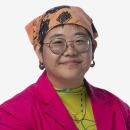
- Share via
Phnom Penh is more than 14 hours by plane from Long Beach, yet Cambodian expatriates in and around this city still feel threatened by their native land’s repressive government — and determined to push for change.
More than 200 Cambodians gathered recently at Cal State Long Beach to celebrate the launch of the Khmer Movement for Democracy, led by the political exile Mu Sochua.
“We believe that in Long Beach there are many Cambodian democrats,” said Sochua, who once served as Cambodia’s minister of Women’s and Veteran’s Affairs. “We need to bring the clear movement for democracy here and set the base so that we open up the space for our community in Long Beach.”
For decades, Cambodia has been dominated by the Cambodian People’s Party, whose longtime leader, Hun Sen, blocked independent media outlets and silenced Sochua and other critics of his regime with threats of violence. The country’s Supreme Court and top election officials reinforced Sen’s grip by disbanding or blocking Cambodia’s top opposition parties from fielding candidates in national elections.
A former Khmer Rouge commander, Sen, won another term last year after a campaign marked by “surveillance, intimidation, judicial harassment, and violent attacks intensified against members of the political opposition, both inside and outside Cambodia,” according to Human Rights Watch. Then Sen handed his spot as prime minister to his son, Hun Manet, staying on as head of the party. Although some observers hoped that Manet, who attended the U.S. Military Academy and New York University, would show more support for democratic values, critics have called his ascent to power as another chapter in Cambodia’s dynastic rule.
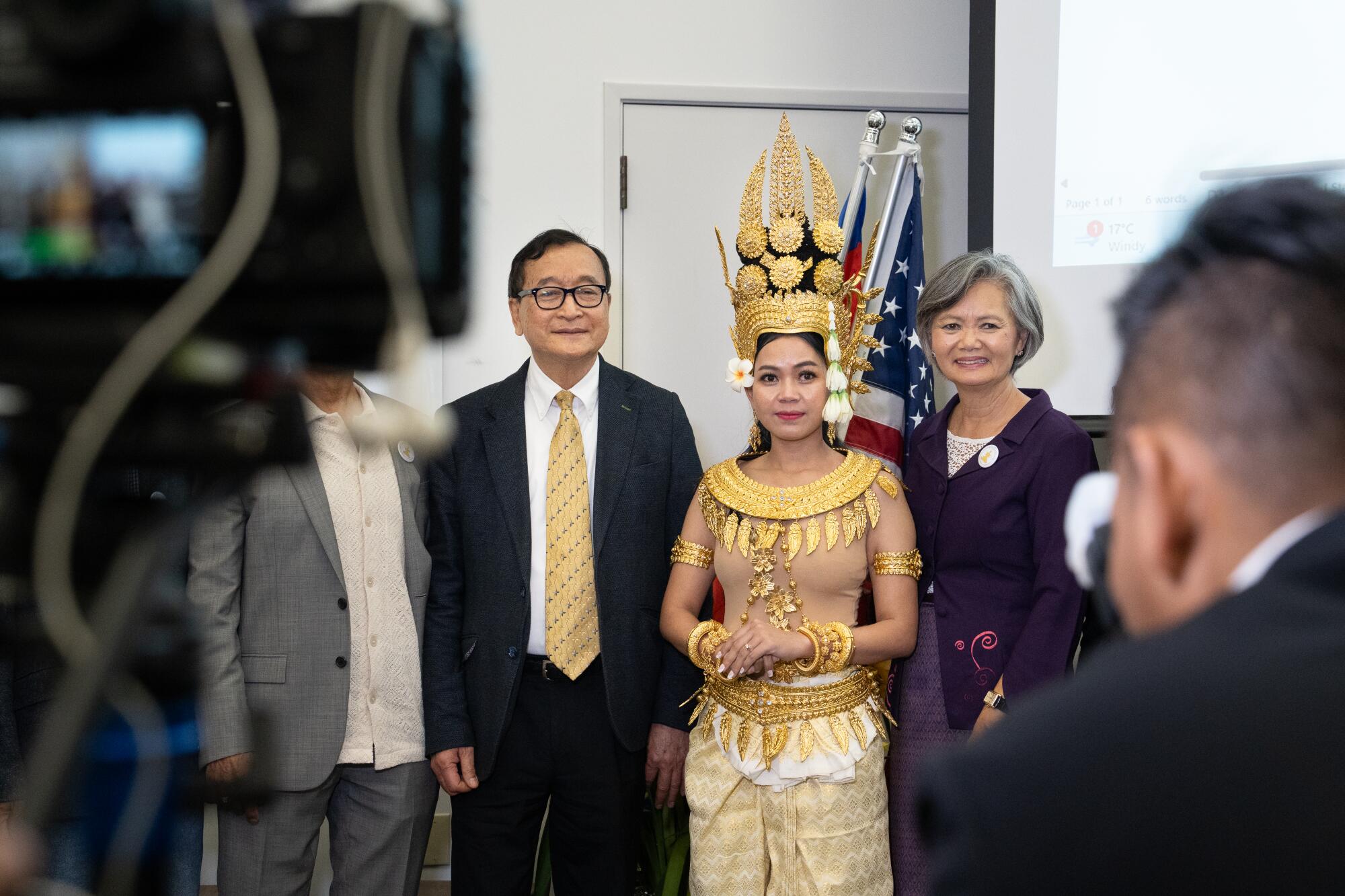
Now Sochua, a 2005 Nobel Peace Prize nominee, hopes to campaign abroad to garner support from Cambodians in the diaspora. The goal is to convince the international community to impose sanctions on Manet’s government for being in violation of the 1991 Paris Peace agreement that ended the Third Indochina War and established a democratic framework in Cambodia.
Among the nonprofit’s stated goals are deterring corruption, promoting international relations and building a nonviolent, inclusive coalition of women, LGBTQ+ people, migrant workers and more.
Thousands of precious antiquities disappeared from Cambodia during decades of war and strife. Now the country is taking on California museums to get them back.
A culture of fear and silence
Sochua chose Long Beach to launch the pro-democracy movement for strategic reasons: It’s home to the largest Cambodian diaspora outside of Southeast Asia, and fertile grounds for dissent against Manet.
But in Long Beach, surveillance and fear run deep.
Sophea Seng, a Cambodian American professor of Asian American studies at Cal State Long Beach, declined to speak on the record for this article.
Susan Needham, a respected anthropologist in the Long Beach Cambodian community, also declined to be interviewed out of concern for putting others at risk.
Needham’s 2022 paper, “Controlling the Opposition Abroad: Cambodia’s Extraterritorial Activities in Long Beach, California,” argues that Manet headed the youth division of the Cambodian People’s Party not to indoctrinate Cambodian youth, but to monitor and disrupt dissent against Sen’s government abroad.
Needham noted in her paper that Sen’s government has always had strong opposition in the diaspora. But in recent times, diaspora politics have been complicated by expatriates’ fear that their comments could endanger the economic and familial ties they have to Cambodia.
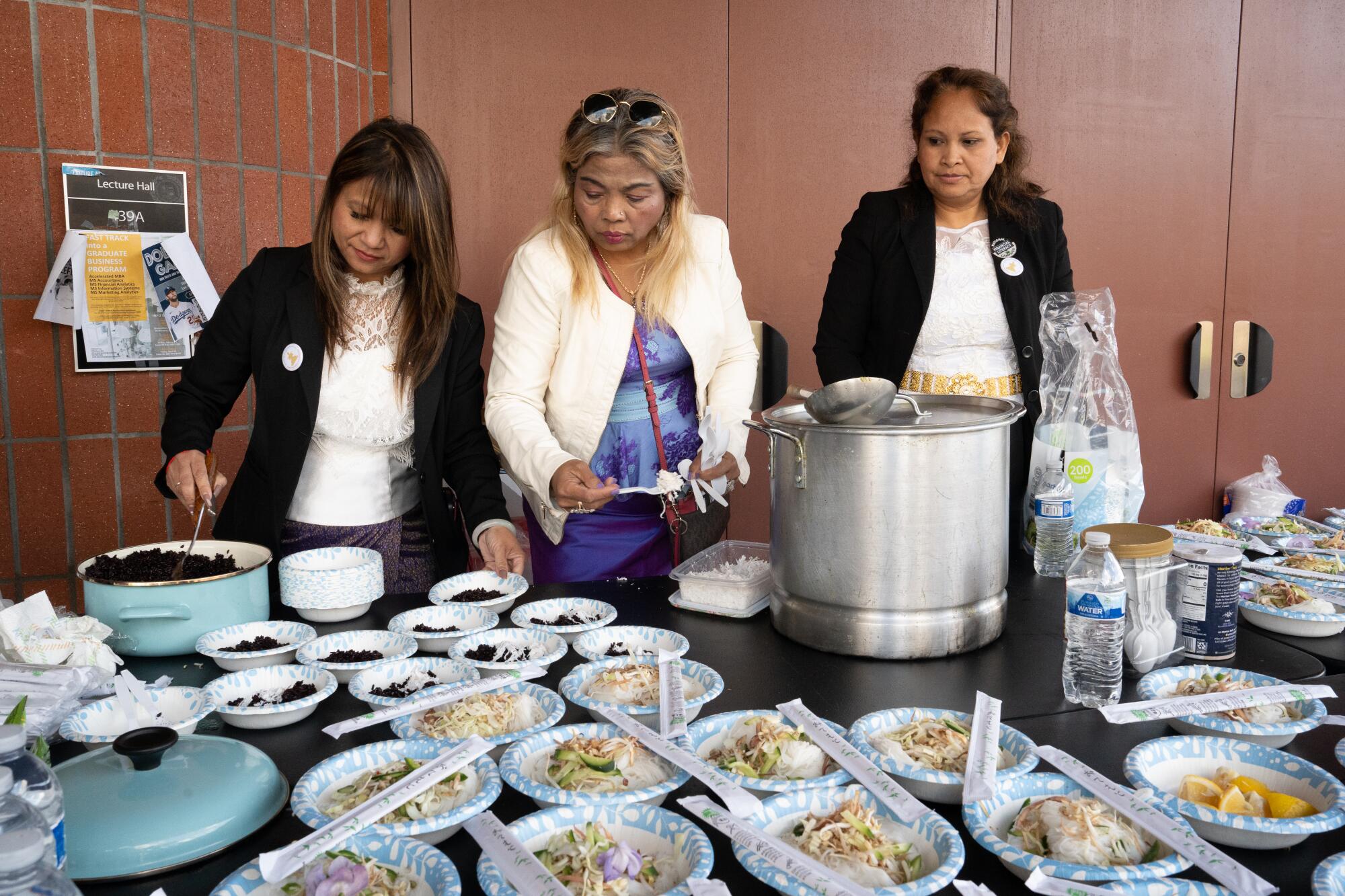
Pauline Nou, a psychotherapist and nurse who had driven down from Modesto to attend the event, came with the perspective of someone who had survived the Khmer Rouge’s brutal re-education camps in the 1970s and the genocide epitomized by that regime’s notorious killing fields. She likened her peers to abused children who still crave a broken home.
“To these people any change could be worse ... they say at least we know what it’s like with [Hun Sen],” Nou said. But Nou isn’t one to be intimidated by such threats. “If I die for what I believe for, OK.”
A phrase often used to praise Sen’s government ahead of election season was “Thank you peace,” Nou said. The slogan tells Cambodians to be grateful even if their land is being taken away, because the regime has brought economic development to the country, and it’s an improvement over the communist era when “you can’t even pray, you can’t even cry,” she said.
Struggling to connect to second-generation Cambodian Americans
No speaker at the Long Beach event was more eagerly anticipated than Sam Rainsy, a once-rising political star in the 1990s who’s lived in and out of exile in France for almost two decades. Supporters still call the 75-year-old Cambodia’s “father of democracy.”
“Use your freedom to fight for the freedom of your people!” Rainsy shouted to rousing applause.
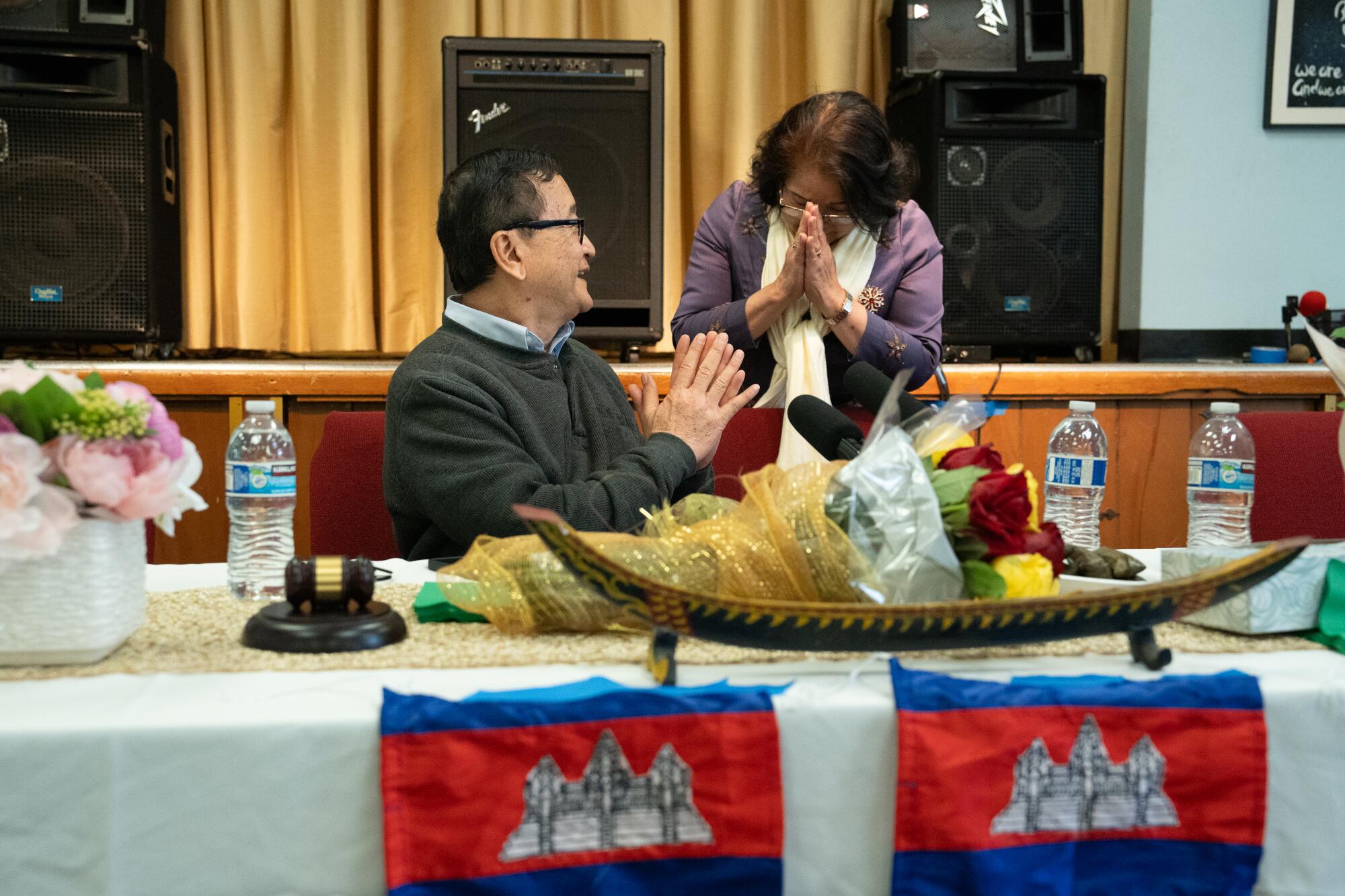
Once a key opposition-party leader, Rainsy has been forced to flee Cambodia twice by threats of imprisonment and assassination. Rainsy’s image has been tarnished in the past for using a racist term to describe Cambodian citizens of Vietnamese descent. But Rainsy, who has Chinese ancestry, dismisses these attacks against his character as planted by the Cambodian government.
He says he’s motivated less to advance his political career than to foster youth participation in Cambodian democratic politics.
“Many people still look at me as a symbol. Sometimes you need a symbol to ensure the unity of a movement,” Rainsy said the day after the rally as he was meeting with the Long Beach chapter of the Cambodian National Rescue Party. “I am pushing young politicians to get ready so that one day I will not be available anymore.”
Rainsy and other members of the pro-democracy movement define “the youth” broadly to include people in their 40s and 50s; few attendees at the pro-democracy event were Gen Z or millennial Cambodians.
Sophal Ear, a Cambodian American political scientist at Arizona State University, said in an email that there are many reasons why it’s harder to politically engage younger Cambodian Americans, including language barriers, a lack of connection to Cambodia, and a lack of awareness about the Khmer Rouge because their elders were reluctant to recount the traumas they experienced.
The organization hasn’t compiled a list of email addresses yet, and it didn’t help that different promotional fliers online listed different locations on campus for the event. But despite the hiccups in getting the word out, nearly every seat in the lecture hall was filled.
Linda Ou, the chief secretariat of the Khmer Movement for Democracy, described an “old-fashioned” grassroots campaign that brought people from all over the state to listen to international speakers from Japan, Taiwan, Korea and France.
“It was all word of mouth, it was crazy,” Ou said of the effort. “You have these people that love democracy, telephone [their neighbors] and knock on their doors.”
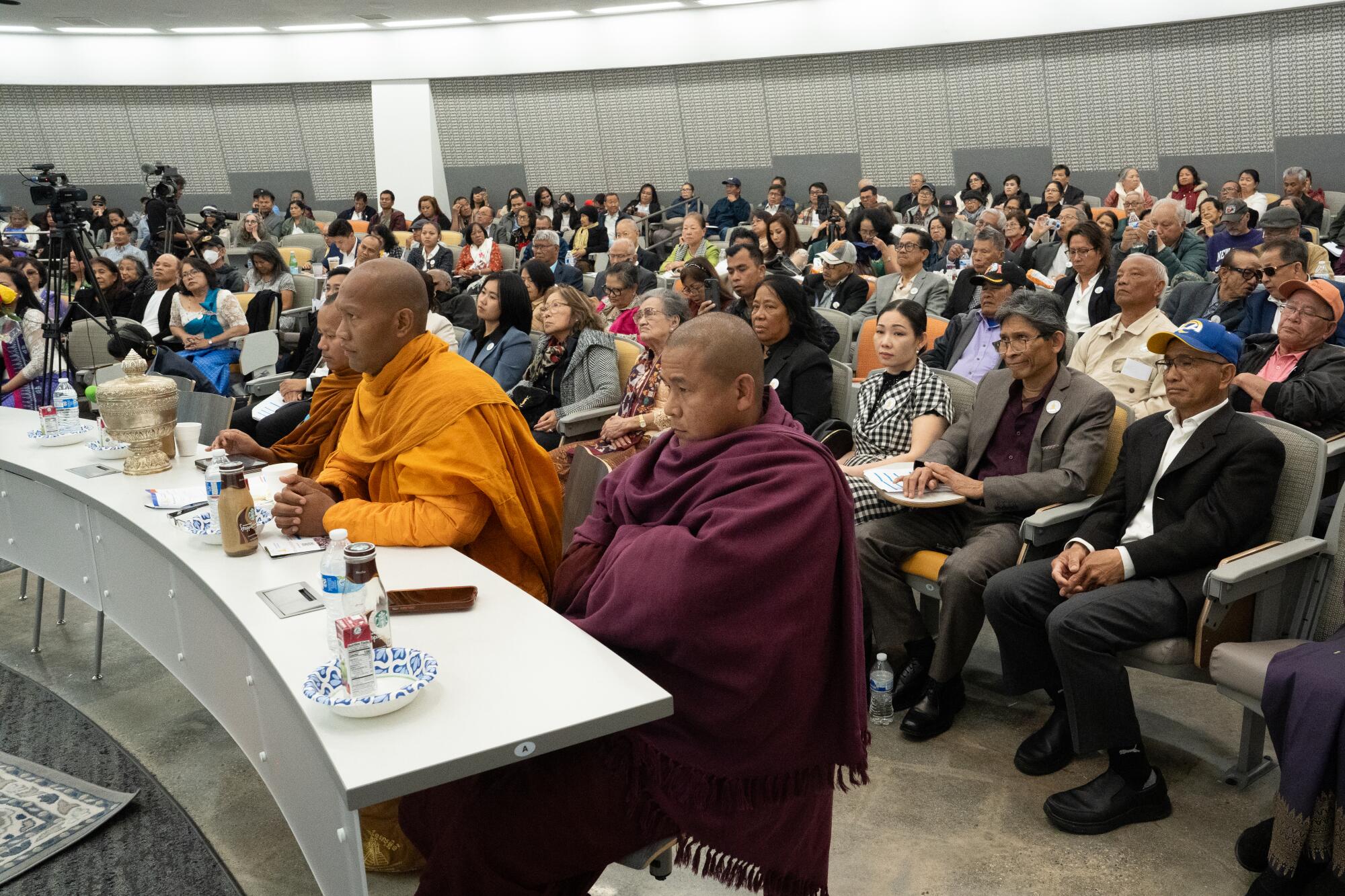
One of the handful of Gen Zers in attendance was 15-year-old Mian, who wore a plaid scarf sewn with Cambodian flag patches. (Mian declined to use her full name out of concern that she could be banned from entering Cambodia for discussing her political beliefs.) Like many of the other teens in the room, she was brought by her parents, who drove down from Fresno.
“I’m kind of taught to not say that my parents are in politics to people at my school because [my parents] are with the opposing party,” Mian said of speaking to her Cambodian classmates. “I feel like a lot of people in my area aren’t with the democracy.”
Mian is currently teaching herself to read and speak Khmer fluently with the support of her mom, but she said it’s too traumatic sometimes for her parents to dive too deeply into the past. Their stories go only so far before stopping, she said, “because they always go, ‘Oh, I don’t want to talk about this. It makes me too sad.’”
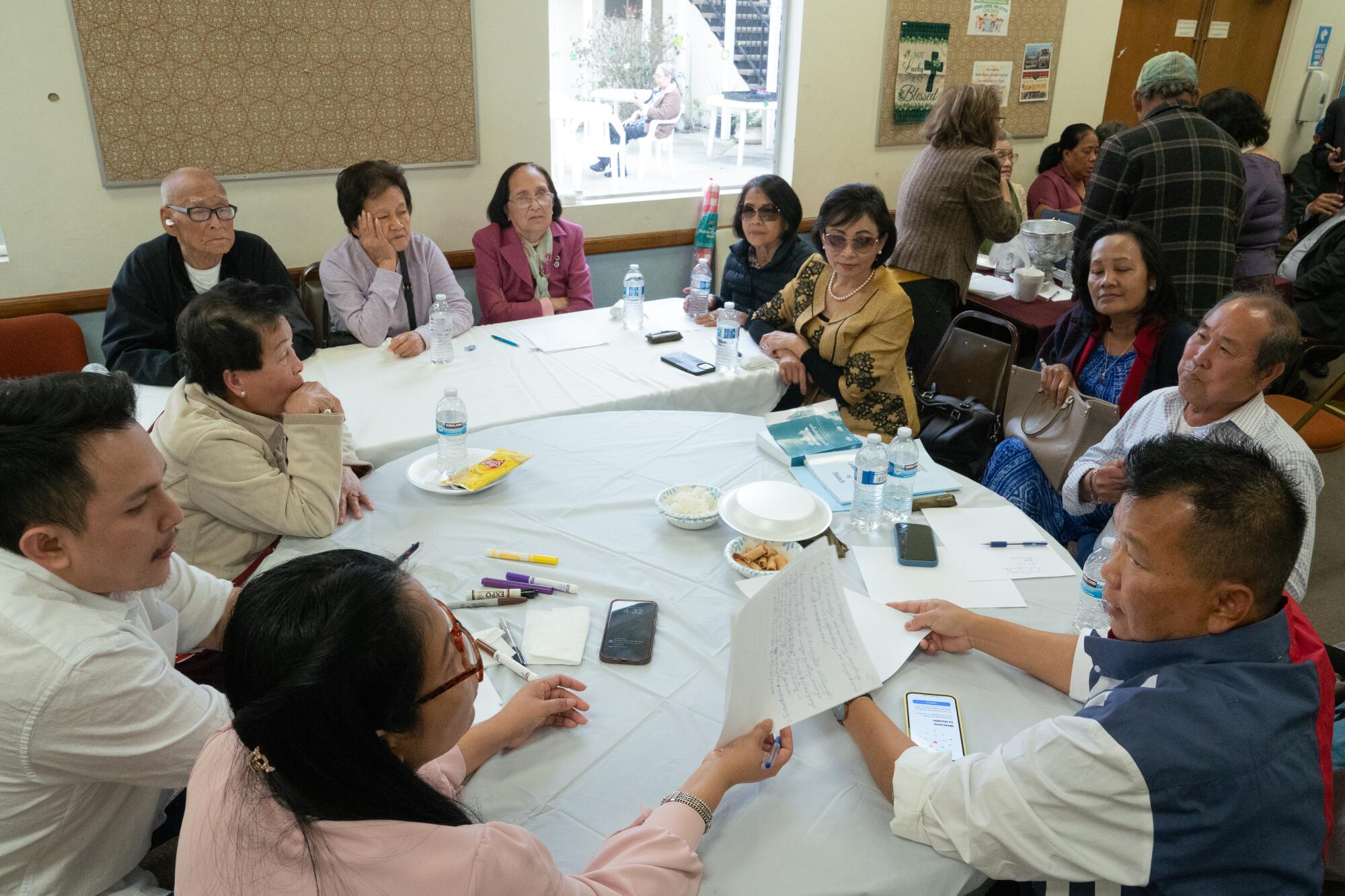
Cold war overtones
Speaking mainly in Khmer, various panelists talked about their dream for a Cambodia with free-speech rights against a backdrop of Cambodian and U.S. flags hanging side by side. Ear, who’s studied Cambodia’s international relations, said that many who oppose Manet’s strongman rule idealize U.S. civil freedoms and consider America to be “the antithesis of Cambodia when it comes to politics.”
One father, Mike Tomkiel, had driven more than four hours from San Clemente to the pro-democracy event to impart these aspirational values to his two sons.
“This is the only place on Earth that close to heaven. You have the right to say anything you want,” said Tomkiel, who remembers surviving the killing fields at around the same age his sons are now. “They told me to kneel down ... I was only 8 or 9 years old ... they killed my whole family.”
The Khmer Movement for Democracy already enjoys bipartisan support from Sens. Marco Rubio (R-Fla.) and Edward J. Markey (D-Mass). But Ear said it was a legitimate concern that the fledgling democracy movement could be co-opted to serve U.S. geopolitical goals, “given the United States’ strategic interests in Southeast Asia, particularly in countering China’s influence.”
For Tomkiel, the choice between the two superpowers is simple.
“The cold war is already there,” he said referring to China’s growing military influence in Cambodia. “I prefer the U.S. to take over the situation right now.”
More to Read
Sign up for Essential California
The most important California stories and recommendations in your inbox every morning.
You may occasionally receive promotional content from the Los Angeles Times.




